Matthias Mueller, the executive often given credit with steering Volkswagen Group through the worst crisis in its post-War history, has been pushed aside, replaced as CEO by Herbert Diess, the head of the flagship VW brand.
The elevation of Diess comes at a time when Volkswagen is charting a path that calls for greater sales and profits, lower costs, and a decreasing dependence on the diesels that had been a foundation, albeit a troubled one, for the company. Diess will also oversee a restructuring that will reform the parent company into three groups and could lead to the eventually spin-off of its truck and bus division.
The 64-year-old Mueller was elevated to CEO in 2015, following revelations that VW had rigged its diesel engines to illegally pass emissions tests. He “has done outstanding work for the Volkswagen Group,” the automakers said in a statement, work that included dealing with angry regulators, shareholders and owners and negotiating settlements, fines and buybacks that ultimately are expected to cost VW about $30 billion in the U.S. alone.
(Click Here to check out VW’s new Atlas Sport Cross SUV.)
Mueller, who had a contract running through 2020, stepped in, the statement added, “when the company faced the greatest challenge in its history. Not only did he safely navigate Volkswagen through that time; together with his team, he also fundamentally realigned the Group’s strategy, initiated cultural change and, with great personal commitment, made sure that the Volkswagen Group not just stayed on track but is now more robust than ever before.”
But it is the 59-year-old Diess who has gained the confidence of key players, including Wolfgang Porsche and Michael Piech, heirs of VW founder Ferdinand Porsche and the carmaker’s top shareholders.
With a degree in factory automation, the Bavarian native started out with Bosch, the world’s largest automotive supplier, before joining BMW AG, where he spent eight years on its management board. Passed over for the CEO job, Diess was recruited by Volkswagen in 2015, just months before the U.S. Environmental Protection Agency accused the German automaker of rigging its diesels.
Like Mueller, Diess had to deal with that crisis, among other things coping with the loss of some of his top lieutenants, including the brand’s technology chief. The new VW boss quickly embraced the idea of electrification, calling for a steady decrease in dependence on the diesel engines that had long accounted for the majority of the division’s sales. Among other things, he announced plans to launch an all-new sub-brand, Volkswagen I.D., which would focus on all-electric models like the Buzz, a reinvention of the once-iconic VW Microbus.
Diess also put an emphasis on autonomous driving and new mobility services, such as ride-sharing, that are expected to reshape the transportation industry over the coming decades. “Bringing Herbert Diess’ CEO nomination forward is the next step in transforming VW into a more modern and effective company,” Evercore ISI analyst Arndt Ellinghorst said in a note to investors.
But while he has shown a visionary streak, Diess also won support within VW Group’s top managers for his skill as a budget-cutter. When he was first hired in, then-CEO Martin Winterkorn gave the new executive a mandate of trimming 5 billion euros, or $6 billion, in costs over the next two years.
That didn’t always go smoothly, as it required putting pressure on workers in Germany who are some of the most highly paid in the auto industry. Diess ultimately prevailed, winning a 2016 settlement that called for eliminating 30,000 jobs, saving 3.7 billion euros, or $4.6 billion.
The company still has a long way to go to match competitors in efficiency. Last year it produced about 10.7 million vehicles, only slightly more than rival Toyota, but Volkswagen Group still counts 642,000 worldwide employees compared to the Japanese maker’s 364,000.
“My most important task will now be to join with our management team and our group workforce in consistently pursuing and pushing forward our evolution into a profitable, world-leading provider of sustainable mobility,” Diess said in the Volkswagen statement.
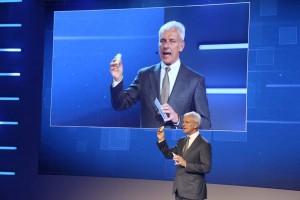
Matthias Mueller was heading Porsche when he was tapped to serve as CEO as the diesel scam unraveled.
Thursday’s announcement is expected to mark just the beginning of broader changes that will, among other things, see other moves at the senior management level. That includes more representation at top levels for the powerful works council, or German union group.
(VW upping the EV ante by placing $25 billion in battery orders. Click Here for more.)
VW will now break its 12 different brands into three separate groups:
- The volume group will include mass-market brands such as Volkswagen, Seat and Skoda;
- The premium group will be anchored by Audi, which had already had an unusual degree of autonomy;
- The super-premium group will include the likes of Lamborghini and Bentley.
For the last two decades, Volkswagen Group voraciously acquired other brands, including Porsche, which was defeated in its own David-v-Goliath bid to acquire VW. And former CEO Winterkorn even tried to force Fiat Chrysler Automobiles to sell its Alfa Romeo brand. But under Diess, the company could move in a different direction. The company said Thursday that it will prepare the truck and bus division for capital markets, a move that could eventually result in offering separate shares in the operation – possibly a spin-off, according to some observers.
Despite the new structure, Diess will have significant power over all VW Group’s automotive tentacles. He will not only head the management board reporting to the company’s board of directors, but he will also oversee R&D, vehicle development and new areas such as mobility services.
“We have previously expressed fears that history might rhyme, and VW might ultimately tire of his medicine,” Max Warburton, an analyst with Sanford Bernstein, wrote to investors. “But instead of being squeezed out, he has been pushed upward, and has been made CEO. This is a major development. It’s a sign of real change at VW. And it should be welcomed by investors.”
(A VW pickup? Click Here to see what might be in store for the Atlas Tanoak concept.)

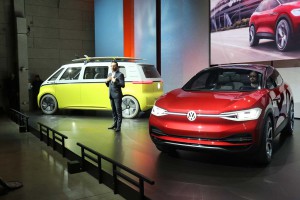
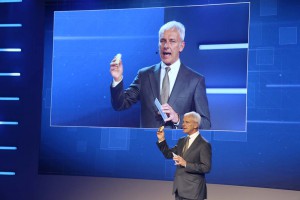
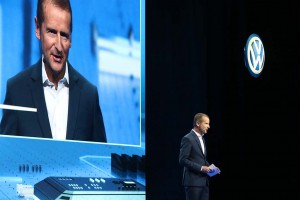
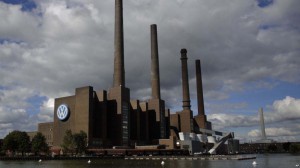
Mueller would be a good pick for Ford.